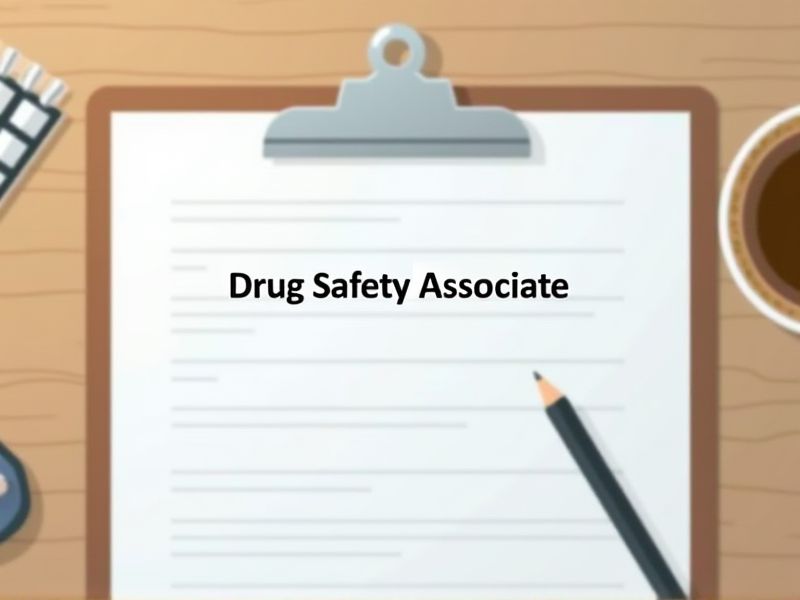
In the realm of pharmaceuticals, ensuring drug safety is paramount to protect patients and achieve regulatory compliance. Drug Safety Associates play a crucial role in monitoring and evaluating the effects of medications, which demands a deep understanding of both pharmacovigilance and regulatory requirements. Certifications in this field validate the associate's knowledge and expertise, fortifying their ability to assess drug safety data accurately. Here are some important certifications you may need to excel as a Drug Safety Associate.
DIA Pharmacovigilance Fundamentals Certificate
The DIA Pharmacovigilance Fundamentals Certificate is essential for a Drug Safety Associate because it provides in-depth understanding of regulatory requirements and industry standards. This certification enhances one's ability to effectively monitor and evaluate adverse drug reactions, ensuring patient safety. Employers often prefer candidates with this certificate as it exemplifies a standardized level of proficiency and commitment to safety. The knowledge gained also aids in better communication with cross-functional teams, facilitating improved decision-making processes.
Good Clinical Practice (GCP) Certification
Good Clinical Practice (GCP) Certification ensures a Drug Safety Associate understands international ethical and scientific quality standards for clinical trials involving human subjects. This certification reinforces the associate's competence in managing and reporting adverse drug reactions effectively. GCP knowledge helps maintain the integrity and accuracy of safety data, crucial for regulatory compliance and public health decisions. Adhering to GCP guidelines minimizes risks in clinical trials, safeguarding participants and enhancing the reliability of trial outcomes.
Regulatory Affairs Certification (RAC)
Obtaining Regulatory Affairs Certification (RAC) equips a Drug Safety Associate with a comprehensive understanding of drug regulations, which directly impacts their ability to ensure compliance with safety standards. The certification validates expertise in regulatory processes, enhancing credibility with stakeholders and regulatory agencies. Increased knowledge in regulatory affairs assists Drug Safety Associates in accurately interpreting and applying guidelines, leading to improved drug safety monitoring. This certification also broadens career opportunities by aligning skills with industry requirements for regulatory proficiency.
Drug Safety and Pharmacovigilance Certificate
Obtaining a Drug Safety and Pharmacovigilance Certificate is essential as it ensures a comprehensive understanding of drug regulations, helping prevent safety issues during the lifecycle of a drug. This certification equips Drug Safety Associates with skills to accurately identify and analyze adverse drug reactions, crucial for patient safety. The certificate enhances professional credibility, making associates more adept at compliance with international safety standards. Employers value certified individuals for their ability to minimize legal and financial risks associated with drug safety.
Certified Clinical Research Professional (CCRP)
The role of a Certified Clinical Research Professional (CCRP) ensures that Drug Safety Associates adhere to rigorous industry standards and regulatory guidelines. Certification indicates a foundational understanding of clinical trial processes, which is pivotal for effective monitoring of drug safety. This knowledge helps in identifying and mitigating potential risks associated with pharmaceutical products. Possessing a CCRP enhances credibility and can improve communication with regulatory bodies and stakeholders.
Clinical Data Management Certification
A Clinical Data Management Certification enhances a Drug Safety Associate's understanding of data integrity and accuracy, which is critical for ensuring reliable safety evaluations. Knowledge gained from such a certification helps in the implementation of standardized protocols that minimize errors during data collection and analysis. Proficiency in clinical data management enables the early identification of adverse drug reactions, facilitating timely risk mitigation. Certification ensures compliance with regulatory standards, bolstering the credibility of safety assessments in regulatory submissions.
Certificate in Pharmacoepidemiology
Certificate in Pharmacoepidemiology equips Drug Safety Associates with advanced skills in assessing the real-world use and effects of medications. It provides expertise in analyzing drug-related risks and benefits, crucial for improving patient safety. The knowledge gained helps in identifying adverse drug reactions more effectively. It enhances decision-making processes for safer drug management practices.
Advanced Signal Detection and Risk Management in Pharmacovigilance Certificate
Advanced Signal Detection and Risk Management in Pharmacovigilance Certificate equips Drug Safety Associates with the skills to identify and assess potential safety concerns in medicinal products. Enhanced detection capabilities lead to early intervention, reducing the risk of adverse effects on patients. Knowledge in risk management ensures that Drug Safety Associates can design and implement strategies to mitigate identified risks. Certification validates expertise, increasing credibility and trust among regulatory bodies and healthcare stakeholders.
MedDRA (Medical Dictionary for Regulatory Activities) Certification
MedDRA Certification is essential for a Drug Safety Associate because it ensures standardized communication and coding of medical information, which is critical for global drug safety surveillance. Certification enhances the ability to accurately interpret and report adverse events, minimizing errors in safety data analysis. Pharmaceutical companies favor certified individuals to maintain compliance with international regulatory standards. The certification supports career advancement by demonstrating expertise in applying MedDRA terminology effectively.
Lean Six Sigma Yellow Belt Certification
The Lean Six Sigma Yellow Belt Certification provides Drug Safety Associates with foundational skills in process improvement, enhancing efficiency in tracking and evaluating adverse drug reactions. Understanding Lean Six Sigma principles helps in identifying and eliminating process waste, which leads to faster and more accurate drug safety assessments. The certification equips professionals with data-driven methodologies to improve quality and compliance in pharmacovigilance activities. Trained associates can better contribute to cross-functional teams, aligning safety processes with organizational goals and regulatory standards.
Summary
When you, as a Drug Safety Associate, obtain relevant certifications, your expertise in pharmacovigilance is significantly enhanced. Certification leads to improved job prospects, often resulting in quicker career advancement. Confidence in handling complex data increases due to validated knowledge. Employers perceive certified associates as assets, potentially influencing higher salary offers.
